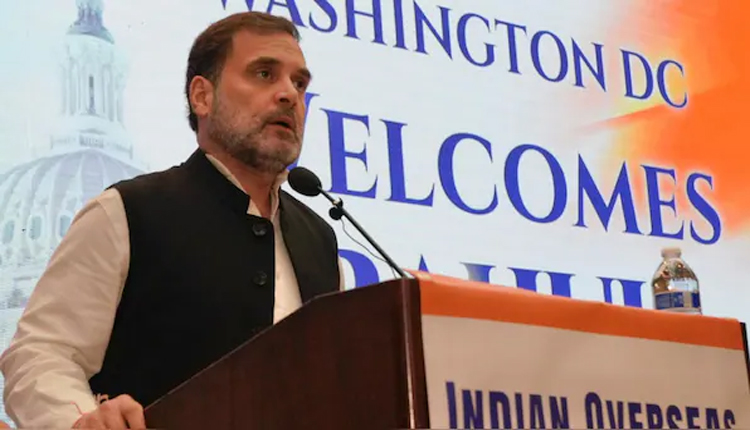New Delhi: Congress leader and Leader of Opposition in Lok Sabha, Rahul Gandhi, has once again found himself at the centre of controversy during his recent trip to the United States. His statements on issues ranging from China, Sikhs, reservations, and unemployment have drawn sharp criticism back in India. Adding fuel to the fire, his meeting with US Congresswoman Ilhan Omar, a vocal critic of India, has further intensified the backlash.
During his address to students at the University of Texas, Gandhi remarked that “India does not lack skills, but those with skills are not respected here.” He suggested that India should focus more on production, much like China, which he claimed “dominates global production and does not face unemployment.” This comment drew severe criticism from several Indian political leaders.
BJP Hits Back Over Gandhi’s Comments
Union Minister Giriraj Singh accused Gandhi of promoting China’s image over India’s. “Rahul Gandhi is branding China while India’s manufacturing sector is growing significantly,” he said, pointing out that “exports have increased from Rs 19 lakh crore to over Rs 75 lakh crore.” Singh added, “Whoever disparages India’s progress abroad is no friend of the country.”
Criticism also came from Union Home Minister Amit Shah, who accused Gandhi of “endangering the security of the country” and promoting “divisive thinking.” Shah stressed that as long as the BJP is in power, they will not allow anyone to undermine India’s unity or the system of caste-based reservations.
Remarks on Sikhs Draw Further Condemnation
During a discussion in Virginia, Gandhi made a reference to Sikh identity, asking a Sikh man, “Will a Sikh be allowed to wear a turban or a bangle in India?” This remark was met with a strong response from Union Minister Hardeep Singh Puri, who stated, “I have been wearing a turban and kada for more than 60 years and have never faced any issue. Such statements are provocative and baseless.”
Puri highlighted the Sikh massacres during the tenure of Gandhi’s father, former Prime Minister Rajiv Gandhi, and accused Rahul Gandhi of attempting to create divisions among the Sikh community both inside and outside India.
Debate Over Reservation and Unemployment
Gandhi’s comments on caste-based reservations at Georgetown University also drew attention. He stated, “Congress will consider ending reservations only when everyone in the country has equal opportunities.” Union Minister Kiren Rijiju criticised Gandhi’s remarks, calling them “unfortunate” and accusing him of making statements that could destabilise India’s social fabric.
On unemployment, BJP MP Anurag Thakur countered Gandhi’s claims by stating that India has made substantial progress in reducing unemployment. “Rahul Gandhi should not go abroad and defame India,” Thakur remarked, noting that significant foreign investments are coming into India due to the country’s growing global reputation.
Meeting with Ilhan Omar Provokes Anger
Gandhi’s meeting with Ilhan Omar, a US Congresswoman known for her anti-India stance, has also sparked outrage. Omar has supported controversial positions on Kashmir and Khalistan, and her meeting with Gandhi was seen as an endorsement of her views. BJP national general secretary Dushyant Gautam criticised the meeting, saying, “Rahul Gandhi has stooped to opposing the nation by meeting MPs who campaign against India.”
BJP IT cell chief Amit Malviya also criticised the meeting, alleging that Gandhi is close to “foreign MPs who oppose India” and accused him of wanting to rule India by dividing its people.
Political Fallout Continues
As Gandhi’s US trip continues to attract controversy, the BJP has accused him of consistently speaking against India abroad for political gain. Union Agriculture Minister Shivraj Singh Chouhan labelled Gandhi’s actions “a crime akin to sedition” and suggested that “no patriot would tarnish the image of their country on foreign soil.”
Despite the intense criticism, Gandhi has not yet responded to the BJP’s accusations. His remarks and meetings in the US continue to spark debate and discussion across India’s political spectrum.



Comments are closed.